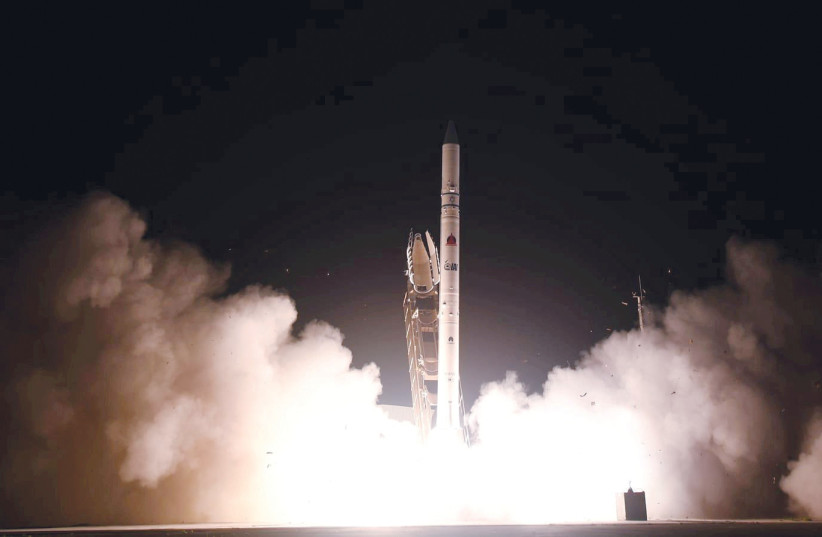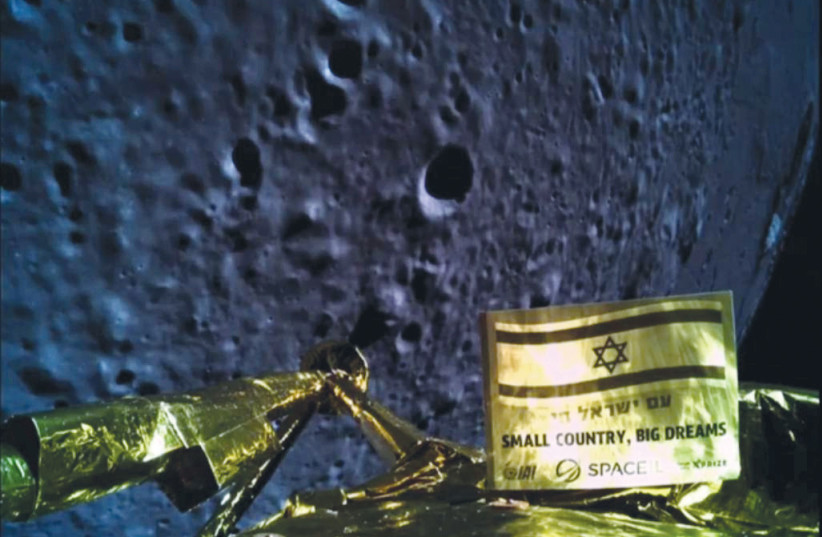When Dr. Dan Blumberg was appointed the new chairman of the Israel Space Agency (ISA), he found himself blessed with an incredible honor but also saddled with a heavy burden.
Being appointed to the post is a sign that Science and Technology Minister Orit Farkash-Hacohen and Science and Technology Ministry Director-General Hilla Haddad Hamelnik have a high amount of trust in him, he explained, but also noted that he now has the burden on his shoulders of making sure everything he does is what is best for the space agency.
After being announced as chairman on July 4, Blumberg spoke to the Magazine about what it means to be in the ISA, how the space sector has dramatically evolved over the years, and how he hopes to steer Israel’s space ambitions in the right direction.
<br>The Israel Space Agency
Since its founding in 1983, the ISA has made major strides in its goal of establishing a thriving program, with the capability of carrying out satellite launches.
It achieved this goal relatively quickly, with the Ofek-1 satellite being launched in 1988. Since then, the agency has continued to advance the Jewish state’s space program, carrying out several satellite launches since, many of which continue to operate.

This makes Israel a member of the small, exclusive group of nations capable of launching satellites, becoming the eighth country in the world to do so. Currently, that list consists of just the US, Russia, Japan, France, the UK, Ukraine, India, China, North Korea, South Korea and New Zealand.
But not only has Israel launched its own satellites, but it has also even created its own rockets for it, the Shavit 2. This has given Israel a significant edge in the space sector thus far, but the sector has continued to progress forward.
“In the past decade, more countries are now making strides in nanosatellites,” Blumberg told the Magazine. “We need to catch up.”
“I’m chairing the board that oversees the Israel Space Agency. The advisory committee is the same as a board in a private enterprise, but the shareholders are the nation.”
Dan Blumberg
<br>Steering the agency in the right direction
As chairman, Blumberg is not necessarily in charge of the day-to-day operations of the ISA. Rather, that role went to Director Uri Oron, who was appointed to the position, in 2021.
Rather, the chairman is someone who is an established scientist, with experience in the space sector.
This is certainly something Blumberg brings to the table, having a wealth of experience in the field of planetary sciences and planetary geography. His work has seen him analyze and observe Mars and Venus, study the evolution of the solar system, make use of sophisticated radar and imaging technology and on using them on spacecraft. He also led the collaboration between Ben-Gurion University of the Negev (BGU) and Israel Aerospace Industries (IAI) to launch the BGUSAT, a CubeSat (a type of miniature, lightweight satellite) that was successfully launched in 2017.
Blumberg also serves as a professor at BGU, is the university’s vice president for Regional and Industrial Development and is the head of BGU’s NASA-affiliated Earth and Planetary Image Facility.
Further, according to Google Scholar data, Blumberg’s work has received thousands of citations over the years.
This breadth of experience is important, as the new chairman has big shoes to fill.
“The shoes I have to fill are those of Gen. Prof. Isaac Ben-Israel, huge shoes,” Blumberg explained. “It’s not a simple task to get into those shoes, but I hope I can bring a new perspective given that I come from a background of space sciences. I’ve been studying these issues for quite awhile, and I hope I can bring a new perspective and push things forward.”
As chairman, Blumberg will be able to continue his scientific work. However, he will also look over the actions of the ISA and review strategy and missions. Though the role is often seen by some to be that of an advisory committee, he likens it to being the chairman of a board of directors in a company.
“I’m chairing the board that oversees the Israel Space Agency,” he said. “The advisory committee is the same as a board in a private enterprise, but the shareholders are the nation.”
<br>Israel’s cosmic ambitions
Though space was once the domain of just a few powerful countries, which has changed in recent years, and is set to change even more in the coming decade.
This is especially true, as not only are more countries getting involved in space missions, either through their own programs or through joint regional organizations like the European Space Agency (ESA), so too are private companies.
Many private firms have already launched their own satellites, especially communications satellites. Companies like SpaceX and Rocket Lab have made massive strides in developing rockets that can launch satellites or other spacecraft out of orbit, with the former having even developed spacecraft that can carry humans. Billionaires Sir Richard Branson and Jeff Bezos have also been working on advancing the field of space tourism with their Virgin Galactic and Blue Origin ventures, respectively. The Houston-based start-up Axion Space has even been working on a fully privately owned and operated space station, and launching manned missions for private scientific research.
Overall, space is becoming more accessible, which in turn means that it’s becoming cheaper and the technology is rapidly changing.
Israel, Blumberg said, needs to catch up with these changes.
“Israel needs to be a major player in space as a nation and as a collective of companies of economic enterprises.”
Dan Blumberg
“Israel needs to be a major player in space as a nation and as a collective of companies of economic enterprises,” he explained.
This involves promoting the growth of more companies and individuals in Israel that are involved in the space sector, which in turn means that more must be done to cultivate human capital to work in a very challenging field.
Space has several commercial opportunities that make it an attractive area for business. And already, Israel has been making some progress in this regard.
“Israel has also been a player in the field of space medicine, conducting medical studies in space,” Blumberg said, referencing the Israeli start-up Space Pharma, a company that developed a mobile research laboratory to conduct experiments in space. It’s technology was even brought to the International Space Station (ISS) by Israel’s second-ever astronaut, Eytan Stibbe, during the Rakia Mission, in April.
However, Blumberg argues that there is room for more companies like Space Pharma in Israel.
In addition, there are other sectors Israel can get involved in too, such as communications, with the new chairman noting that the influx of revolutions to communications in the last couple of decades is only set to continue, now that space is more accessible.
BUT OVERALL, space has no shortage of opportunities.
“Space industries are multidisciplinary. That means you can come from almost any discipline, provided you have a drive for understanding how to operate systems in space,” Blumberg said.
One such opportunity that is available in space is ventures regarding climate change.
“Globally, space has been an area where satellites have been used for monitoring climate change,” he noted, adding that this is something Israel can invest in.
Another thing Blumberg hopes to accomplish is to have the ISA work with many private companies.
“There are a lot of new players, companies, in the space sector,” he explained, specifically referencing major global firms, like Google. “I think Israel is going to have to find ways to collaborate with these multinational companies and be one of the service providers, if not leaders, meeting their needs and answering them.”
But he also hopes to have the ISA collaborate with other countries, as well.
“Space being something that is so huge and so challenging means it always requires collaboration. Even between the US and Europe, there’s always been lots of collaboration,” Blumberg explained, adding that “Israel being such a small country means we especially benefit from collaborations.”
Already, the ISA has had several collaborations with other countries. This includes the Spaceborne Hyperspectral Applicative Land and Ocean Mission (SHALOM), a joint mission between the ISA and its Italian counterpart to create and launch a hyperspectral satellite to orbit the Earth.
Another example is the Matroshka AstroRad Radiation Experiment (MARE), a collaboration between the ISA, NASA and the German Aerospace Center (DLR) alongside private companies StemRad from Israel and Lockheed Martin from the US to test the AstroRad protective vests as a possible means of shielding astronauts from radiation.
These collaborations are something Blumberg hopes will continue.
“Use of space for peaceful efforts and peaceful missions is a great way for Israel to position itself as a scientific leader in the world,” he explained. “I know that due to the Abraham Accords, Israel has started discussing and collaborating with moderate Arab countries and I think there’s huge potential there, and I think we’ll have to look globally for other countries.”
He also said a big goal of his would be having Israel become more involved in European space missions.
“I really hope Israel could at some point join the ESA or be more involved in the European space sector,” Blumberg explained. “This is one of my main goals, though there are others.”

ONE OF those other goals would be the Beresheet 2 mission.
The first Beresheet mission was the result of the private organization SpaceIL and the state-owned IAI, with the involvement of the ISA, which sought to launch and land a probe on the Moon. In 2019, the mission technically succeeded – contact was lost with the probe shortly before landing and it ended up crashing on the lunar surface – making Israel the fourth country to land a probe on the Moon.
Since then, work has been underway on the follow-up: Beresheet 2, which also seeks to go to the Moon. However, there is interest in it being a collaborative mission with other nations, with the United Arab Emirates – one of Israel’s newest allies and which has a budding space program of its own – being among those who are interested.
Blumberg hopes to help them along.
“One of my own challenges is going to be helping SpaceIL raise the international support for Beresheet 2 because it’s a private and voluntary effort, and I think the space agency can provide support to get them the help they need,” he explained.
But overall, this push to advance Israel’s space field further is motivated by a desire to keep Israel not just on the same level with the rest of the advancing world, but ahead of the curve.
“Israel needs to position itself globally as a leader in the areas of newspace (the emergence of the private spaceflight industry), small satellites, CubeSats (a class of miniaturized satellite based around a form factor consisting of 10 cm. cubes), technology to be used on nanosatellites, imaging methods and more,” Blumberg said. “If we don’t go faster than the others, it means we’re going backward.”
